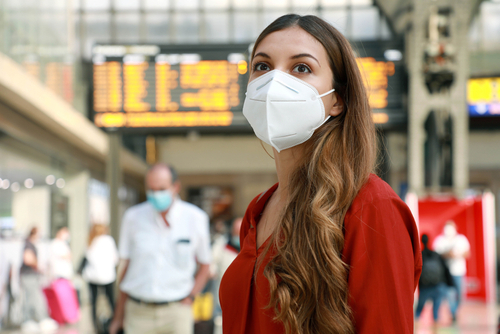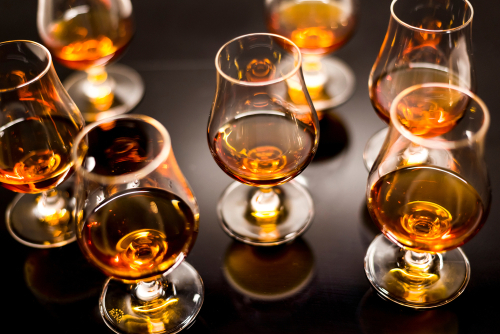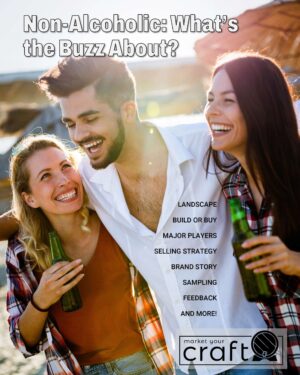 After a year of virtual conferences, online festivals and remote tasting, it’s hard to imagine sponsoring a booth at a crowded in-person event. Yet some of the industry’s biggest gatherings are scheduled for the next couple months. Will they even happen? If so, should you plan to attend? All questions craft beverage producers and organizers are being forced to answer in real-time as the Delta variant of COVID-19 threatens another shutdown.
After a year of virtual conferences, online festivals and remote tasting, it’s hard to imagine sponsoring a booth at a crowded in-person event. Yet some of the industry’s biggest gatherings are scheduled for the next couple months. Will they even happen? If so, should you plan to attend? All questions craft beverage producers and organizers are being forced to answer in real-time as the Delta variant of COVID-19 threatens another shutdown.
The challenge? Financial and other commitments are made months in advance, yet some events are being cancelled or postponed only weeks before execution, leaving brand representatives in limbo. Today we look at those aspects of your team’s event strategy you CAN control, including:
- Defining your COVID-19 travel policies
- Sizing up the business opportunities
- Acknowledging competitor activity
Why is this important? Just because you’re registered as a sponsor of an upcoming event or tradeshow doesn’t mean you’re obligated to attend. Over the next couple months, you will potentially need to make some difficult, but practical, decisions with respect to masks, capacity restrictions and possibly closures. We’ve seen this before and are better prepared to address it if/when it happens. Communicating a clear position on in-person events shows leadership and builds confidence with your team. Even if it means bowing out of some commitments as a result.
defining your COVID-19 travel policies
 Consider all factors when planning business travel this fall. For many craft beverage brands, it’s their first sponsorship opportunity in over a year! Getting back in front of distributors, retailers and customers is an important part of growing your business. However, the Delta variant has raised questions and concerns about mass gatherings at industry events. When deciding to whether to continue with event sponsorship, a clearly-defined travel policy can help you remain objective. We found an article from Human Resource Executive that’s just as relevant today as it was a year ago when it was written. In it, experts recommend:
Consider all factors when planning business travel this fall. For many craft beverage brands, it’s their first sponsorship opportunity in over a year! Getting back in front of distributors, retailers and customers is an important part of growing your business. However, the Delta variant has raised questions and concerns about mass gatherings at industry events. When deciding to whether to continue with event sponsorship, a clearly-defined travel policy can help you remain objective. We found an article from Human Resource Executive that’s just as relevant today as it was a year ago when it was written. In it, experts recommend:
- Consider the [legal] risks of business-related travel
- Confirm travel is essential (for destinations with greater restrictions)
- Make travel optional based on the individual’s comfort level
- Prohibit travel for anyone with COVID-19 symptoms
- Make personal protective equipment available
- Select transportation with the strongest safeguards
- Review public health orders for destinations
- Consider additional precautions for returning travelers
The event venue may have additional guidelines to help protect organizers, participating craft producers and attendees. Having a complete understanding of the environment helps you and your team avoid surprises.
sizing up the business opportunities
It seems like a lifetime ago that we wrote about festival economics and whether sponsorship was worth it. Then and now, the benefits of event and tradeshow presence must always justify the cost. However, more uncertainty exists today due to COVID-19:
- Will distributor/retailer partners be there?
- Will my booth materials make it there on time?
- Are state/country travel restrictions likely to change?
- What is the size of the audience attending?
- Is there potential for industry/social backlash for withdrawal from the event?
 Those and other factors when taken individually may not discourage craft beverage producers from moving forward with their plans. But if management is uncertain about two or more areas of participation, the return on investment (ROI) comes into question as well. When deciding whether to proceed with sponsorship or to cut potential losses, consider the following:
Those and other factors when taken individually may not discourage craft beverage producers from moving forward with their plans. But if management is uncertain about two or more areas of participation, the return on investment (ROI) comes into question as well. When deciding whether to proceed with sponsorship or to cut potential losses, consider the following:
- What is the marketing upside of sponsorship? This includes any remaining advertising or promotional opportunities tied to your event attendance.
- What is the on-site upside of sponsorship? Should you move forward, will you achieve your traffic and engagement goals? Will you have the same opportunities around product awareness, lead generation and sales? Are you exposed to new audiences by participating in activities like panels, tastings and after-parties?
- What is the post-event upside of sponsorship? Will you receive a marked uptick in news/editorial mentions as a result? What about favorable attendee response/satisfaction measures with your participation in the event?
There’s not a foolproof formula for estimating the ROI of event sponsorship. And any calculations are further muddied by the COVID-19 X-Factor. But addressing the above topics will put you in a stronger position to make the right decision for the business this event season.
acknowledging competitor activity
 The craft beverage industry is crowded! Drinkers drowning in a sea of sameness look for the stand-out brands to make their decision to try a new beverage easier. You can argue sponsoring an event or tradeshow attended by your customers is one of the most impactful sampling opportunities available. In which case, if your competitors are there, you should be too, right? Regardless of COVID-19?
The craft beverage industry is crowded! Drinkers drowning in a sea of sameness look for the stand-out brands to make their decision to try a new beverage easier. You can argue sponsoring an event or tradeshow attended by your customers is one of the most impactful sampling opportunities available. In which case, if your competitors are there, you should be too, right? Regardless of COVID-19?
First and foremost, no tradeshow is worth putting your team members at [unnecessary] risk. Your travel policy will help you look objectively at the situation before making a decision. Travel and lodging can always be rebooked, especially now. And many event organizers have included pandemic-era clauses in sponsorship contracts which allow for withdrawing under certain conditions. If you do decide that keeping up with the Joneses is important to your business AND you’re comfortable your travel policy can be adhered to, then you better bring your storytelling a-game to get the most value out of your sponsorship. We’ve developed a Guide to help fine-tune your story:
- Understanding your craft beverage superpower
- Knowing what’s sacred in the stories
- Identifying why customers should care (about you, your brand, your product)
- Defining good, better and best customers in your target market(s)
- Sizing-up the competition to find niche opportunities
- Selecting the most effective media for the message
- Budgeting accordingly
Being open to the process and a critical review of their marketing efforts, you and your team will make huge strides with their storytelling strategy. Moving forward, that strategy can serve as the basis for a marketing blueprint around not only events, but social, digital, public relations, packaging, point of sale and all other customer engagement efforts. When your team has that kind of clarity, they are unstoppable champions for your brand!
MailChimp archive:
https://mailchi.mp/1182bd30a617/210812_eventstradeshows?e=bd76eedb35
Download:
https://app.box.com/s/qxf1t5dsp3zdlcpswoc55rqvax15ywci



